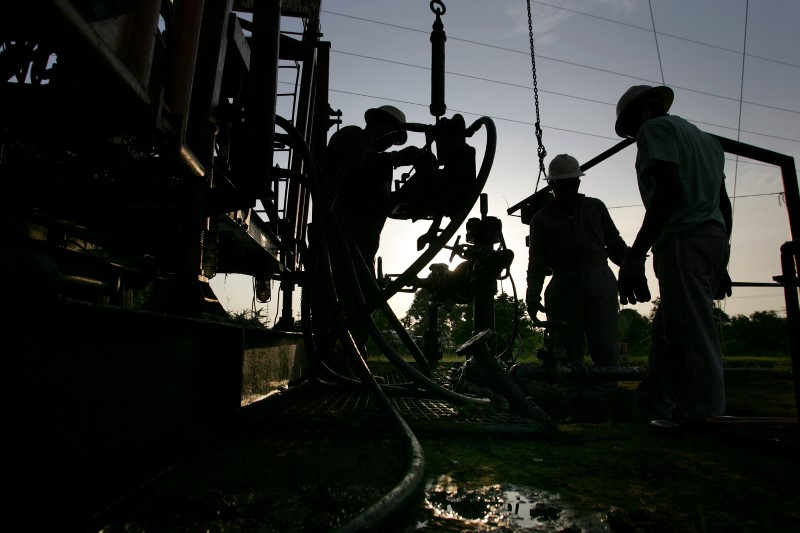(Adds context on negotiations with companies and communities,
additional comments by Perupetro president)
LIMA, Aug 21 (Reuters) - Peru has negotiated a two-year deal
with Canada's Pacific Exploration and Production Corp PRE.TO
to operate and develop the country's biggest oil block, state
regulator Perupetro said Friday.
The Canadian company, which changed its name from Pacific
Rubiales Energy Corp last week ID:nL3N10P3TD , will take over
oil block 192 in Peru's Loreto Amazonian region after the
contract of the current operator, Pluspetrol, expires in eight
days.
The deal was reached through private talks after the auction
of a 30-year concession on the block earlier this month failed
to draw any bids, hampered by low oil prices and thorny
government talks with nearby indigenous communities.
ID:nL1N10F3JX
State-owned energy company Petroperu will not take a
minority stake in the oil block as is permitted by law, Rafael
Zoeger, president of regulator Perupetro, said at a press
conference.
Perupetro is the state agency tasked with overseeing
industry contracts, while Petroperu is the state-owned company
that refines and transports oil products.
Peru had also negotiated with Perenco Ltd, Omega Energy
International S.A. and Pluspetrol for rights to block 192 before
the deal with Pacific Exploration was finally reached.
Pacific Exploration's proposal offered the highest proceeds
for the state, said Zoeger, who was named head of Perupetro last
month.
Zoeger was previously a manager at BPZ Resources Inc, a
Houston-based energy company that operated a Peru offshore block
with Pacific Exploration before BPZ went bankrupt earlier this
year. ID:nL1N0WB2GL
Block 192 now produces about 10,000 barrels of oil per day,
about a fifth of Peru's relatively small output.
Protests by indigenous communities that say block 192
operations have polluted their lands have disrupted output
several times in recent years.
The government recently reached a deal with some native
communities in the oil block but talks with others broke down
last week.
Native communities in the Pastaza River Basin will oppose a
new operator until their demands for a higher share of oil
proceeds and strengthened environmental monitoring are met, said
indigenous leader Chino Dahua.
Negotiations with those communities will restart next week,
Deputy Culture Minister Patricia Balbuena said.
- English (USA)
- English (UK)
- English (India)
- English (Australia)
- English (South Africa)
- English (Philippines)
- English (Nigeria)
- Deutsch
- Español (España)
- Español (México)
- Français
- Italiano
- Nederlands
- Polski
- Português (Portugal)
- Português (Brasil)
- Русский
- Türkçe
- العربية
- Ελληνικά
- Svenska
- Suomi
- עברית
- 日本語
- 한국어
- 简体中文
- 繁體中文
- Bahasa Indonesia
- Bahasa Melayu
- ไทย
- Tiếng Việt
- हिंदी
UPDATE 1-Peru gives Canadian firm two-year contract for biggest oil block
Published 2015-08-21, 12:13 p/m
UPDATE 1-Peru gives Canadian firm two-year contract for biggest oil block

Latest comments
Install Our App
Risk Disclosure: Trading in financial instruments and/or cryptocurrencies involves high risks including the risk of losing some, or all, of your investment amount, and may not be suitable for all investors. Prices of cryptocurrencies are extremely volatile and may be affected by external factors such as financial, regulatory or political events. Trading on margin increases the financial risks.
Before deciding to trade in financial instrument or cryptocurrencies you should be fully informed of the risks and costs associated with trading the financial markets, carefully consider your investment objectives, level of experience, and risk appetite, and seek professional advice where needed.
Fusion Media would like to remind you that the data contained in this website is not necessarily real-time nor accurate. The data and prices on the website are not necessarily provided by any market or exchange, but may be provided by market makers, and so prices may not be accurate and may differ from the actual price at any given market, meaning prices are indicative and not appropriate for trading purposes. Fusion Media and any provider of the data contained in this website will not accept liability for any loss or damage as a result of your trading, or your reliance on the information contained within this website.
It is prohibited to use, store, reproduce, display, modify, transmit or distribute the data contained in this website without the explicit prior written permission of Fusion Media and/or the data provider. All intellectual property rights are reserved by the providers and/or the exchange providing the data contained in this website.
Fusion Media may be compensated by the advertisers that appear on the website, based on your interaction with the advertisements or advertisers.
Before deciding to trade in financial instrument or cryptocurrencies you should be fully informed of the risks and costs associated with trading the financial markets, carefully consider your investment objectives, level of experience, and risk appetite, and seek professional advice where needed.
Fusion Media would like to remind you that the data contained in this website is not necessarily real-time nor accurate. The data and prices on the website are not necessarily provided by any market or exchange, but may be provided by market makers, and so prices may not be accurate and may differ from the actual price at any given market, meaning prices are indicative and not appropriate for trading purposes. Fusion Media and any provider of the data contained in this website will not accept liability for any loss or damage as a result of your trading, or your reliance on the information contained within this website.
It is prohibited to use, store, reproduce, display, modify, transmit or distribute the data contained in this website without the explicit prior written permission of Fusion Media and/or the data provider. All intellectual property rights are reserved by the providers and/or the exchange providing the data contained in this website.
Fusion Media may be compensated by the advertisers that appear on the website, based on your interaction with the advertisements or advertisers.
© 2007-2024 - Fusion Media Limited. All Rights Reserved.